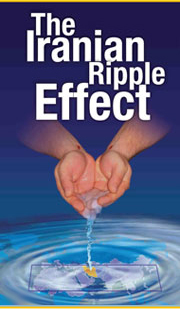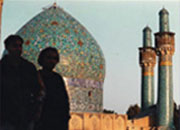The Story of Donald Fareed: a Former Muslim’s Quest to Transform a Nation
 |
|
| Download PDF of Fareed's Story | |
Donald Fareed was born and raised in Iran. After his parents were divorced when he was a young man, he felt empty and began to question many things about his life and his belief systems. Fareed was disillusioned, finding that the God of Shi’ite Islam that controlled his country was impossible to know or to reach.
He began to explore other avenues for enlightenment. Sufism, a complicated form of Islam, proved to be laden with superstition, mystery and too many strange rules. Self-improvement psychology and “New Age” science were equally unfulfilling. Both Sufism and the New Age movement could not fill his soul, so Donald concluded that he could become his own keeper, and achieve financial independence through entrepreneurship in America. Making money became his ultimate goal
Fareed immigrated to the United States with $23 in his pocket. However, with the freedom and opportunity afforded to him only in America, he soon managed to launch a carpet cleaning and restoration service, which quickly became very profitable. For Donald; however, making money was not the answer to his soul searching. He still strived to find meaning in his life.
Fareed went back to school and graduated with multiple majors among the top 2% of his college. Still, though, he felt a need for spiritual fulfillment. He then turned his desire for fulfillment to starting a family. He met Rima, an Iranian-Assyrian native, and they were married in 1985 in San Jose, California.
Rima’s father was not thrilled that his daughter had married a Muslim man. Nevertheless, he was a fervent Christian, and modeled this for the first five years of their marriage. Fareed’s own father had never been very good at expressing his love, so he found it hard to understand the idea of a loving Heavenly Father. After five years, the marriage was falling apart and then came the 1989 Loma Prieta earthquake, which shook the foundations of his business and his self-sufficiency.
Rima's cousin one day invited three Christian pastors to their home. The three pastors fervently persuaded Fareed to study the Bible and follow Jesus. Fareed was annoyed by their persistence. Finally, to make them leave, he mouthed a prayer expressing belief in the lordship of Jesus Christ. He didn’t understand it at the time, but after saying the prayer, Fareed says he felt a Presence he had never experienced before. Somehow, that annoying visit from the pastors inspired him to search anew for the truth after years of disappointment.
He began to study the Bible in depth, but had difficulty with some concepts, especially the notion of “The Trinity.” Five months later after the visit, Fareed says he had a vision early one morning. Jesus appeared to him, forgave his sins, and gave him the understanding and the ability to explain the Trinity to Muslims. That was the beginning of a brand new direction in Fareed’s life.
Fareed became a vibrant evangelist among Muslims, and was sponsored by his church to travel to Turkey, Istanbul and Europe over a three-year period. He saw healing and miracles, and hundreds of Muslims who heard his simple message were brought to faith in Christ. He met and became friends with Bishop Haik Hosepian, the overseer of the Assemblies of God in Iran. Hosepian was outspoken in his Christian faith, and had been pressing the Islamic government in Iran to release Pastor Mahdi Dibaj from prison. The pastor had been in prison for 11 years after leaving Islam for Christ. Consequently, the government had also targeted Hosepian, but his efforts eventually resulted in the pastor’s release. Unfortunately, Mahdi Dibaj was only free for a few days before someone who believed him an apostate of Islam stabbed him to death.
Haik Hosepian was not afraid to die for his beliefs. He remained outspoken against the Islamic regime, and in 1994, he also became a martyr. Hosepian’s murder had a deep impact on Fareed. He resolved to make it his life’s mission to promote Iranian democracy and tolerance, and to continue teaching Muslims about the Christian faith.
In another vision, Fareed says the Lord directed him to plant churches and to reach the masses through media. He became an ordained minister in 1997 and took his message to radio and public television in Northern California. In just four years, 500 Muslims had come to faith in Christ and two churches were planted.
In 2000, Fareed was diagnosed with acute fibromyalgia after he started experiencing severe muscle spasms all over his body. His digestive and immune systems began to fail and he suffered from crippling muscle pain and severe weakness. His doctors gave him only 6 to 9 months to live, and he was forced to resign as pastor of his church. Spurred by the thought of a shortened life, he continued promoting political reform in Iran and preaching the gospel, expanding his efforts to the Internet and several Muslim-owned international satellite TV stations.
The year 2000 also saw the birth of the non-profit Persian Ministries International (PMI.) Fareed invested $1,200 in a camera and lighting equipment and produced a Farsi-language program called “Rahnamodhaye Massih,” which means “The Guidance of Jesus.” The show was aired on three Muslim owned stations and reached a regular audience of 1.5 million weekly.
In the broadcast, Fareed spoke clearly about why he had converted to Christianity. He presented the Gospel, and explained the Trinity and the deity of Jesus in a way that Muslims could understand. People started talking about the program. Fareed’s outspoken views as an advocate for religious freedom has had a great impact on the development of the current democratic initiative known as the “Green Movement” in Iran.
Still believing that he would not live much longer because of his poor health, Fareed boldly spoke out against the lies and deception he saw in the radical Islamic regime, impressing certain Muslims who were looking for direction and alternatives to Islam with his fearlessness.
Fareed was given a new lease on life when, by the grace of God, he experienced a miraculous recovery from the disease, surprising even his doctors. PMI went on to broadcast his message with over 50,000 hours of programming on satellite television, which included leadership and discipleship training along with the Gospel message. The cell churches in Iran were growing and the ministry of PMI encouraged them, giving them tools to confront the government with peaceful civil disobedience, prayer and evangelism.
Current estimates show at least a million Muslims converted to faith in Christ in Iran alone over the past decade, and about 18,000 cell churches have been planted. Each of these converts is at risk of anything from losing their job to being put to death as an apostate. In spite of this, the cell churches are growing. Alarmed by the rate of conversion to Christianity, Iranian officials have vowed to stop the trend. They have imprisoned and executed church leaders and have utilized technology to attempt to interfere with Christian Internet and satellite broadcasts. The government persecution has only served to strengthen the resolve of PMI to get their message out to the people of Iran. They are continually changing their signals so Internet access is not interrupted. They have developed a team inside Iran who are using every means possible to provide leadership training, evangelism, discipleship and church planting support within the country. Bibles and other materials are being printed and distributed in-country.
Anti-Christian crackdowns have increased but at the same time, young people have increasingly taken part in pro-democracy demonstrations. Millions of people came out in June 2009 to protest the election results. Many of the protesters were former Muslims who are now members of Christian cell groups. The underground movement continues to grow and flourish.
At age 50 and still married to Rima, Donald Fareed still suffers from pain associated with his fibromyalgia, but he continues with his satellite TV and Internet ministries and a number of other projects. He presents workshops, seminars, and sermons to churches in the US, promoting love and understanding and encouraging Christians to love and reach out to Muslims in their local communities.
Fareed also works with PMI team members who live in other countries such as Europe, Japan, Israel and other parts of the US. Together, they have planted a number of active Iranian churches in Europe and Asia.
Fareed is used to death threats since he began to speak on satellite television. He says, “I live one day at a time. I never know if I will be here tomorrow.” In 2004, he preached a sermon at a Nazarene church in Sunnyvale, California entitled “Why I am not a Muslim,” which resulted in worldwide attention to Fareed and his work, but also an increased intensity to the death threats. Since then, he has been able to form new relationships with radical US Islamic groups who were upset with the sermon at the time.
In Fareed’s opinion, millions of Iranians are disillusioned with the country’s political system and with the Islamic faith. The majority of the populations (over 70%) are under the age of 30, and he says, “They have lost hope. They are suffering from the same vacuum I suffered. Iranians have become the most receptive Muslims anywhere in the world.” Fareed believes that his testimony and his messages hold a great deal of relevance for them, and that by the year 2020, over 10 million people will have converted from Islam to Christianity.
Unfortunately, acts of terrorism against the West will continue, as there are still radical Islamists operating around the world. These acts, though, are resulting in greater interest in the Gospel from moderate Muslims. Since the Islamic Revolution in 1979, more people have converted to Christianity than in the past 2000 years combined. This trend continues despite the threats of arrest, torture and martyrdom from the government, and the numbers are unprecedented.
Twenty percent of the world’s population is Muslim – one out of every five people. Currently the rate of mosque-building outstrips that of church-planting in the U.S. American congregations need to understand one important principle in order to begin to work with Muslims. Fareed insists, “Muslims are not the oppressors, they are the oppressed; they are not the enemy, they are the lost.”
Fareed’s seminars include the following topics:
- What Every Christian Should Know About Islam
- A 4,000 Year Old Hatred
- The Roots and Solutions to Terrorism
- Understanding the Muslim Mind and Reaching the Muslim Heart
Fareed says, “We must help them to understand that they have eternal Hope through Christ and can live lives promoting peace. Otherwise, we too, have to deal with the consequences of their hopelessness, as extremist Islam only offers eternal security to those who pursue violent martyrdom for Allah. I want every Muslim in the world to have the opportunity to hear the true gospel and understand the Bible-based principles which have made America great.”




